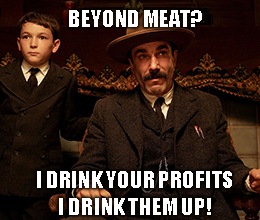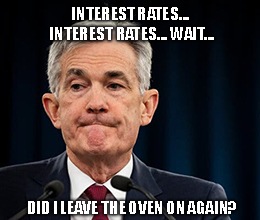Beyond Meat: There Will Be Blood
Are you a fan of the meatless wonder?
Holding some Beyond Meat Inc. (Nasdaq: BYND) in your portfolio, are you?
I can’t say I blame you. BYND is up a massive 300% from its initial public offering (IPO) price of $25. Heck, the shares are even up about 51% from their close near $66 on BYND’s first day of trading.
That’s a pretty impressive gain for just six months.
If you’re holding BYND, there are two key things you need to know right now:
- Beyond Meat reports earnings after today’s close.
- The post-IPO lockup period ends tomorrow.
The first event you likely already know about. You were probably anticipating this event — especially after Beyond Meat wormed its way onto menus at both McDonald’s Corp. (NYSE: MCD) and Kentucky Fried Chicken.
Wait … I’m sorry, it likes to be called KFC now. “Kentucky” and “fried” just aren’t hip anymore.
Analysts anticipate a profit of $0.03 per share on revenue of $82.23 million. That may not seem like much, but it would be the company’s first profit as a publicly traded company.
Actual expectations may be even higher. EarningsWhispers.com puts Beyond Meat’s “whisper” number at $0.06 per share. That’s double the consensus estimate, and a sure indication that the bar has been set very high for Beyond Meat’s quarterly report.
If you’re holding BYND shares, $0.06-per-share earnings sound amazing. Surely you would be able to recoup some of the losses you’ve seen in the past three months — BYND is down about 58% from its July peak, after all.
But there’s one flaw in your plan, and that’s the end of the IPO lockup period. This is the point when company insiders and private investors can take profits on the stock (read: hand retail investors the bag to hold).
Tomorrow, some 48 million shares of BYND will become eligible for trading. That’s about 80% of Beyond Meat’s total shares outstanding. That’s a lot of meatless shares that could hit the market all at once. What’s more, all of those shares were bought before the stock was publicly available — i.e., near $25 per share.
The Takeaway:
Let me address a couple additional points that you might have already thought of.
For one, this isn’t the first time Beyond Meat has seen more shares hit the market. Back in July, the company announced a secondary public offering of 3.25 million shares. That event didn’t impact BYND shares all that much, and it might lull you into a false sense of confidence.
However, 3.25 million is a drop in the bucket compared to the roughly 48 million shares on tap this time around.
For two, short interest accounts for a whopping 25% of BYND’s total float (or shares available for public trading). The only reason this number isn’t higher is because BYND is extremely costly to borrow right now. In the past, this fact has prompted significant short-squeeze rallies as stock prices soared due to limited availability.
That will all change tomorrow when the lockup period ends.
Basically, even if Beyond Meat reports earnings of $0.06 per share and impresses with every metric Wall Street is looking for, short sellers may just take the pain and wait for profit taking to roll in the next day.
What’s more, the influx of new BYND shares could make shorting the stock even easier, thus adding to the downside risk.
If you are holding BYND, you might want to consider taking some profits off the table today, before a potential storm hits tomorrow.

Good: AT&T Fire Sale

It’s amazing what a little activism can do.
AT&T Inc. (NYSE: T) is rallying today, not because of earnings, but because of a strategic three-year plan. And it owes it all to Elliott Management.
Before we get to the plan, let’s drill down on earnings first. It was an overall wishy-washy report. Said earnings rose 4% to $0.94 per share on revenue that fell 2.5% to $44.6 billion. Earnings beat expectations, while revenue missed.
AT&T also said it hemorrhaged 1.2 million pay-TV subscribers and 195,000 DirecTV Now subscribers. Ouch. Need more proof traditional TV is dead?
Now, T might’ve dipped a bit if earnings were the only headline news. But the three-year plan has investors excited. According to the plan, AT&T will add two new board members, sell off up to $10 billion in non-core businesses and pay off all its debt surrounding the purchase of Time Warner.
Elliott Management praised the moves: “We commend AT&T for the positive steps announced today, which will create substantial and enduring shareholder value at one of America’s greatest companies.”
This three-year plan addresses part of the problem I raised back in September. AT&T needs to get its debt level down massively, and this is a plan to do just that. Now, if it can finally slim down its mess of online streaming services, AT&T might be a real threat to Netflix Inc. (Nasdaq: NFLX), The Walt Disney Co. (NYSE: DIS) and Amazon.com Inc. (Nasdaq: AMZN).
Better: Duel of the Fates

Nearly everyone thought that Amazon was a shoo-in to win the U.S. Department of Defense (DoD) Joint Enterprise Defense Infrastructure (JEDI) contract. Amazon Web Services (AWS) had the high ground, after all.
Or so Amazon thought. But Microsoft Corp. (Nasdaq: MSFT) proved you can teach an old Jedi new tricks. The OG software company just stole the 10-year, $10 billion DoD JEDI contract right out from under Amazon.
“We’re surprised about this conclusion,” Amazon told MarketWatch. “AWS is the clear leader in cloud computing, and a detailed assessment purely on the comparative offerings clearly lead to a different conclusion.”
The JEDI contract would have been a massive win for AWS, solidifying its lead in the race for cloud services supremacy. But Microsoft’s Azure now has that contract. And you can bet that Microsoft will leverage this notoriety to bring in more cloud business.
It couldn’t have come at a better time for Microsoft either. The company’s most recent earnings report had analysts worrying about a continued slowdown in Azure revenue — which rose a measly 59% last quarter, compared to 76% growth in the same period last year.
With the JEDI contract in its back pocket, Microsoft now holds the high ground in the cloud systems market. And it’s gunning for Amazon’s title.
Best: Breakfast at Tiffany’s

So, you have Louis Vuitton shoes, a Fendi purse, a bottle of Chandon and some Hennessy for after-dinner drinks. What are you missing?
Diamonds. You’re missing diamonds.
LVMH Moet Hennessy Louis Vuitton (OTC: LVMUY) moved to correct that omission this weekend. The company — which owns all of the aforementioned brands — put in an unsolicited offer of $120 per share for luxury jewelry retailer Tiffany & Co. (NYSE: TIF).
TIF needed the boost, as its shares were down about 24% below their 52-week high on Friday. This morning, Tiffany confirmed the offer and said it is reviewing the offer as per “its fiduciary responsibility.”
Tiffany also said that the “parties are not in discussions” and that shareholders didn’t need to take any action at this time.
TIF is up more than 30% following the news, making it the best gainer on the day.

Quote of the Week? What?
Yes, I know it’s supposed to be time for the Chart of the Week, but this quote from over the weekend was just too good to pass up.
Yesterday, The Wall Street Journal published an article titled “Twilight of the Stock Pickers: Hedge Fund Kings Face a Reckoning.” As you might guess from the title, the article predicts the death of hedge funds and, to some degree, active investing.
But, Banyan Hill expert Michael Carr — editor of Peak Velocity Trader — had some Great Stuff-worthy comments that I just had to share:
The reported death of hedge funds has been greatly exaggerated.
Yes, it’s a tough market. But it’s a huge market. “Today there are more than 8,200 [hedge funds], all trying to find winning bets for what is now a vast trove of $3.2 trillion of investor money.”
Flows into passive investments are cyclical. They are high now, but millennials don’t accept average. They demand the best. They ran up $1.5 trillion in student loans to get the best education, and they will put that education to use picking stocks as they pay down their debt. The alternative is to buy index funds … and that just won’t do for this group.
We know millennials won’t accept average. If they did, they would put butter and jelly on toast instead of avocados.
Their tastes created Robinhood and forced other brokers to offer zero commissions. If we accept that brokers exist to make money — and I have never seen evidence that they don’t — then the shift towards zero commissions indicates they see profit opportunities among millennials who will trade but won’t pay commissions.
There’s that famous BusinessWeek cover of “The Death of Equities” in 1979, as the bull market was starting. The death of stock picking articles is probably a sign that the death of passive investing is drawing near.
From avocado toast to millennial investing, Michael Carr has you covered. You know you want more of Michael’s witty investing advice — why wouldn’t you? Peak Velocity Trader just closed out half a trade that was up 91.25% in only one month!
Gains and wit. Wit and gains. It’s a great combination. To get in now, click here to sign up for Michael Carr’s Peak Velocity Trader!
Great Stuff: Beyond the Headlines
I’m opinionated. There — I said it.
But then, if you’re reading this, you already know that.
Despite that glaring fact, I try to make sure you get both sides of the story when it comes to investing. Opinions don’t make money. Facts make money. And that is why you are here.
Today, I’m sharing with you a different take on Tesla Inc. (Nasdaq: TSLA). As regular readers know, I’m a TSLA bull. I’m not religious about it or anything, like so many Tesla investors are. I just see a bright future for the company in a market that has been excruciatingly slow to adapt to the current market climate (or climate market, it you will).
My only beef with Tesla is that it has trouble staying profitable. This past quarterly report, however, the company reported a surprise profit and crushed TSLA bears with a 20% rally.
But was that report really everything it was cracked up to be?
Banyan Hill expert Charles Mizrahi doesn’t think so. In his recent article, “Tesla’s Q3 Earnings: Slowing Sales and Free Cash Flow Drop,” Charles explains why everything is not as rosy at Tesla as the headlines want you to think.
You can also watch Charles’ explanation in the video below:
Finally, if Charles’ no-nonsense approach to investing strikes a chord with you, I encourage you to sign up for his Alpha Investor Report by clicking here.
Until next time, good trading!
Regards,

Joseph Hargett
Great Stuff Managing Editor, Banyan Hill Publishing










